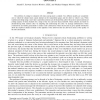Free Online Productivity Tools
i2Speak
i2Symbol
i2OCR
iTex2Img
iWeb2Print
iWeb2Shot
i2Type
iPdf2Split
iPdf2Merge
i2Bopomofo
i2Arabic
i2Style
i2Image
i2PDF
iLatex2Rtf
Sci2ools
103
click to vote
CORR
2007
Springer
2007
Springer
Rateless coding with partial state information at the decoder
The problem of coding for channels with time-varying state is studied. Two different models are considered: one in which the channel state cannot depend on the transmitted signal, and the other in which it can. When randomized coding using a secret key is permitted, schemes are developed that achieve the point-to-point randomized coding capacity of these channels for a range of key size and error decay tradeoffs. These schemes are based on derandomizing fully random codes via sampling and randomizing list codes via message authentication. These constructions are further generalized to rateless code constructions where the decoder is given partial information about the empirical channel. Bounds on the tightness of the achieved rates are derived in terms of the quality of the side information.
Related Content
| Added | 13 Dec 2010 |
| Updated | 13 Dec 2010 |
| Type | Journal |
| Year | 2007 |
| Where | CORR |
| Authors | Anand D. Sarwate, Michael Gastpar |
Comments (0)

